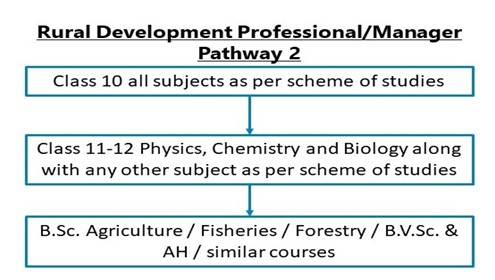Rural Development Professional/Manager
Entry Level Qualification
Graduate
Career Fields
Humanities, Liberals Arts & Social Science
For Specially Abled







 ,
,
About Career
1. Rural Development Professionals / Managers are involved in studying, planning, organizing, directing and controlling ways to improve the quality of life and economic welfare of the people living in rural areas. They are concerned with the improvement and development of the lives of rural people as well as the infrastructure. Rural Development Professionals make changes and improvements in the agriculture, healthcare, education, social situations, economy, employment, management of natural resources, banking and finance, technology, and industries majorly relating to the rural areas.
2. As a Rural Development Professional / Manager, you will be involved in various activities depending upon your specialized area of work. For example, you will look after the up gradation and renovation of the rural infrastructure, you will be involved in managing projects in providing better roads and connectivity to major cities, you also contribute majorly in supplying electricity and internet coverage to underdeveloped areas, you will also ensure the availability of clean water for drinking, you will be contributing towards improving healthcare services like hospitals with trained staff and nurses.
PARTICULARS | DESCRIPTION |
Name | Rural Development Professional/Manager |
Purpose | Program Implementation, Community Engagement & Many More |
Career Field | Humanities, Liberals Arts & Social Science |
Required Entrance Exam | CAT, MAT |
Average Salary | 100000 - 500000 Rs. Per Year |
Companies For You | Rural Development Trust, ActionAid, Grameen Foundation & Many More |
Who is Eligible | Graduate |
Key Roles And Responsibilities
As a Rural Development Professional / Manager, you will be involved in the following roles and responsibilities:
1. You would be involved in developing and implementing organizational policies and procedures in various fields like Healthcare, education, water resource conservation, afforestation, child development etc.
2. You would be involved in maintaining financial records of production or employment records for farms or ranches.
3. You would be involved in coordinating energy assessment, engineering, or construction activities to ensure that wind project needs and objectives are met.
4. You would also be involved in creating wind energy project plans including project scope, goals, tasks, resources, schedules, costs, contingencies, or other project related information.
5. You would plan, direct, supervise, and coordinate work activities of subordinates and staff relating to employment, and compensation for various projects and development activities.
6. You would be involved in strategic and day-to-day operational planning in development of rural infrastructure.
7. As a Rural Development Professional / Manager you would estimate costs and prepare budgets for various development initiatives and projects.
8. You would ensure the implementation of various projects and development plans.
Career Entry Pathway
Class 10 all subjects as per scheme of studies – Class 11-12 with any subject as per scheme of studies – Bachelor’s degree in any subject – PG Diploma in Rural Management / MBA in Rural Management / PG Diploma in Cooperative Management / MSW / PG Diploma in Agribusiness Management / MBA in Agribusiness Management / MBA with specialisation in Social Marketing / similar courses
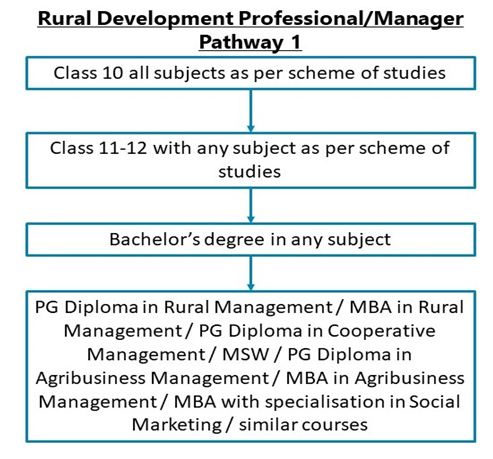
After completing Class 10 all subjects as per scheme of studies and Class 11-12 with any subject as per scheme of studies, you can pursue bachelor’s degree in any subject. After having completed graduation, you can go for a Post-Graduate Diploma in Rural Management/ Cooperative Management/ Agribusiness Management or MBA in Rural Management/ Agribusiness Management/ MBA with specialisation in Social Marketing or similar courses.
Class 10 all subjects as per scheme of studies – Class 11-12 Physics, Chemistry and Biology along with any other subject as per scheme of studies – B.Sc. Agriculture / Fisheries / Forestry / B.V.Sc. & AH / similar courses
After completing Class 10 all subjects as per scheme of studies and Class 11-12 Physics, Chemistry and Biology along with any other subject as per scheme of studies, you can go for B.Sc. in Agriculture/ Fisheries/ Forestry/ Bachelor of Veterinary Science and Animal Husbandry (B.V.Sc. & AH) or similar courses.
Class 10 all subjects as per scheme of studies – Class 11-12 with any subject as per scheme of studies – Bachelor degree in Social Science / Social Welfare / Sociology – Master’s degree in Social Science with specialisation in Rural Development or Social Work or a similar field
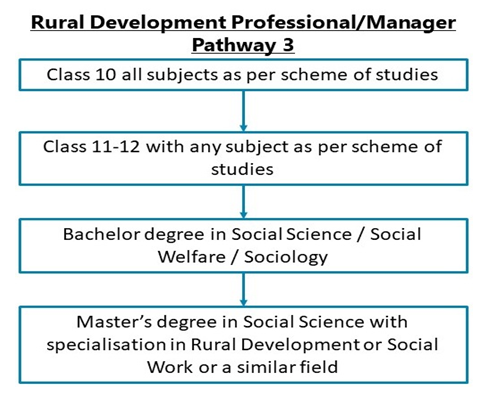
After completing Class 10 all subjects as per scheme of studies and Class 11-12 with any subject as per scheme of studies, you can go for a Bachelor’s degree in Social Science/ Social Welfare. After having completed graduation, you can pursue a master’s degree in Social Science with specialisation in Rural Development or Social Work or similar field.
Class 10 all subjects as per scheme of studies – Class 11-12 Physics, Chemistry and Mathematics along with any other subject as per scheme of studies – Bachelor degree in Electrical Engineering / Mechanical Engineering / Energy Engineering / Power Engineering / or in a similar field – Master degree in Rural Technologies / Rural Energy Technologies / similar field
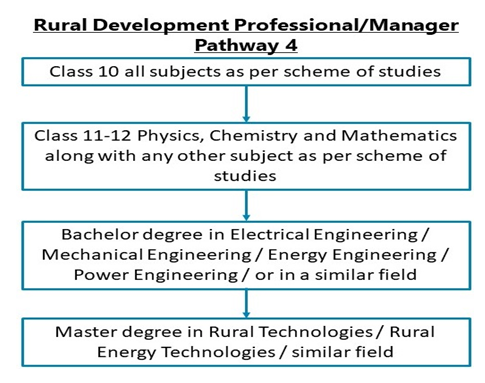
After completing Class 10 all subjects as per scheme of studies and Class 11-12 Physics, Chemistry and Mathematics along with any other subject as per scheme of studies, you can go for a Bachelor’s degree in Electrical Engineering/ Mechanical Engineering/ Energy Engineering/ Power Engineering or in a similar field. After your graduation you can then pursue a master’s degree in Rural Technologies/ Rural Energy Technologies or similar field.
Class 10 all subjects as per scheme of studies – Class 11-12 Physics, Chemistry and Mathematics along with any other subject as per scheme of studies – Bachelor degree in Agricultural Engineering / Civil Engineering / related field – Master degree in Water Resources Engineering / Irrigation Engineering
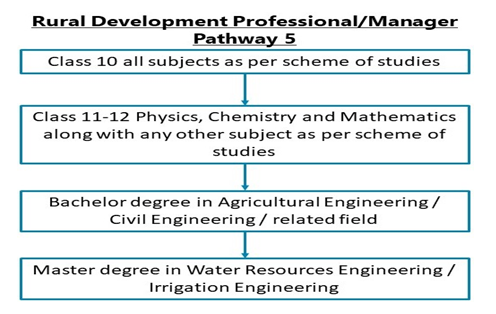
After completing Class 10 all subjects as per scheme of studies and Class 11-12 Physics, Chemistry and Mathematics along with any other subject as per scheme of studies, you can pursue a bachelor’s degree in Agricultural Engineering/Civil Engineering or related field. After completing a bachelor’s degree, you can go for a Master’s degree in Water Resources Engineering/ Irrigation Engineering.
Class 10 all subjects as per scheme of studies – Class 11-12 Physics, Chemistry and Biology along with any other subject as per scheme of studies– B.Sc. Agriculture / Fisheries / Forestry / BVSc. & AH / similar courses – Master degree in Agriculture / Fisheries / Forestry / Agro Forestry / Agricultural Extension/ Fisheries Extension/ M.V.Sc. / ICT in Agriculture / similar courses
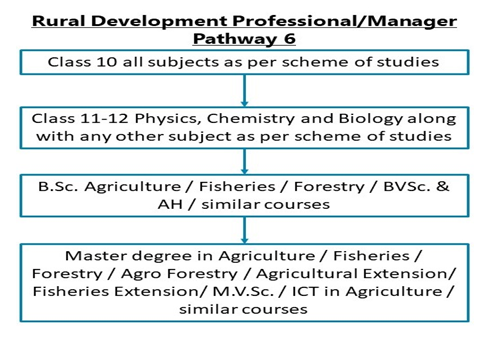
After completing Class 10 all subjects as per scheme of studies and Class 11-12 Physics, Chemistry and Biology along with any other subject as per scheme of studies, you can go for B.Sc. in Agriculture/ Fisheries/ Forestry/ Bachelor of Veterinary Science and Animal Husbandry (BVSc. & AH) or similar courses. After having completed your graduation in one of the above courses, you can pursue a Master’s degree in Agriculture/Fisheries/Forestry/Agro Forestry/ Agricultural Extension/ Fisheries Extension/ Master of Veterinary Science/ ICT in Agriculture or similar courses.
Class 10 all subjects as per scheme of studies – Class 11-12 Physics, Chemistry, Biology and Mathematics along with any other subject as per scheme of studies– B.Tech. in Dairy Technology / Diploma in Dairying
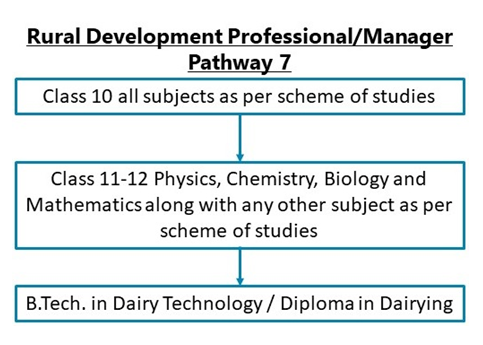
After completing Class 10 all subjects as per scheme of studies and Class 11-12 Physics, Chemistry, Biology and Mathematics along with any other subject as per scheme of studies, you can pursue Bachelor’s in Technology (B.Tech.) in Diary Technology or you can pursue a Diploma in Dairying
Class 10 all subjects as per scheme of studies – Class 11-12 with any subject as per scheme of studies – Bachelor degree in any Discipline
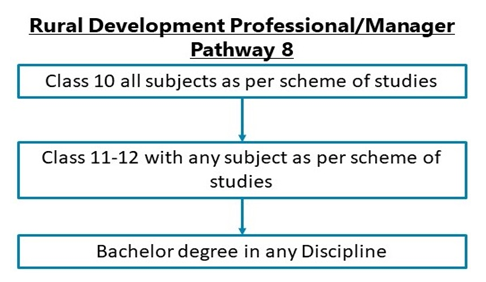
After completing Class 10 all subjects as per scheme of studies and Class 11-12 with any subject as per scheme of studies, you can go for a Bachelor’s degree in any Discipline. Anyone with any degree can work in Rural Development. After your Bachelor’s degree, if you want to be in State Government Services, you can appear for a State Public Service Commission conducted State Civil Services Examination. You can join Grade A services as a Block Development Officer or Grade B services as a Block Lang Revenue Officer if you qualify in the State Civil Services Examination
Class 10 all subjects as per scheme of studies – Class 11-12 with any subject as per scheme of studies – Bachelor degree in Economics – Master degree in Economics with specialisation in Rural Economics or Developmental Economics
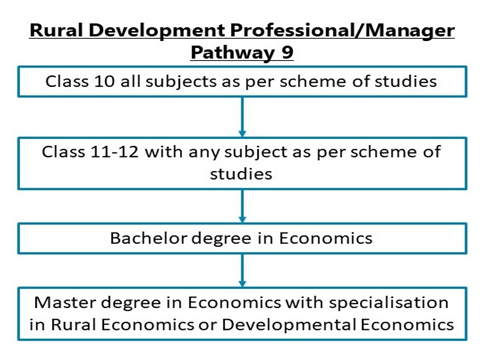
After completing Class 10 all subjects as per scheme of studies and Class 11-12 with any subject as per scheme of studies, you can go for a Bachelor’s degree in Economics. After a graduation degree in Economics you can pursue a Master’s degree in Economics with specialisation in Rural Economics or Developmental Economics.
Class 10 all subjects as per scheme of studies – Class 11-12 Mathematics along with any other subject as per scheme of studies /Class 11-12 with any subject as per scheme of studies – BCA / B.Sc. Computer Science / B.Sc. IT / similar course
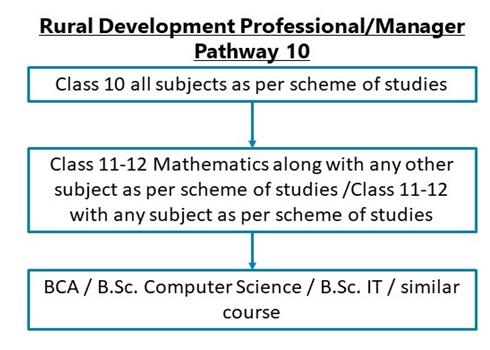
After completing Class 10 all subjects as per scheme of studies and Class 11-12 Mathematics along with any other subject as per scheme of studies, you can pursue B.Sc. in Computer Science. In case you want to pursue B.Sc. IT, you must have studied Mathematics in class 10 whereas in order to do BCA, you can complete class 10 with or without mathematics and class 11-12 in any stream
Required Qualification & Competencies
1. After completing Class 11-12 with any subject as per scheme of studies, you can go for a Bachelor’s in any subject, followed by a Post-Graduate diploma in Rural Management/Cooperative Management or a Master’s in Social work.
2. After completing Class 11-12 Physics, Chemistry and Biology along with any other subject as per scheme of studies, you can pursue B.Sc. in Agriculture or similar courses like BVSc. & AH/ Fisheries. In order to study further, you can do a master’s degree in the same field.
3. After completing Class 11-12 Physics, Chemistry and Biology along with any other subject as per scheme of studies, you can go for a Bachelor’s degree in Engineering (Mechanical/Electrical/Energy/Power) followed by a Master’s in Rural Technology/Rural Energy or similar courses.
4. After completing Class 11-12 Physics, Chemistry, Biology, and Mathematics along with any other subject as per scheme of studies you can pursue B.Tech in Dairy Technology or a Diploma in Dairying.
MINIMUM EDUCATION REQUIRED | MAXIMUM EDUCATION REQUIRED |
Under Graduate Undergraduate Degree / Honours Diploma / Graduate Diploma (equivalent to a Degree) Programs for which the minimum eligibility is a pass in Higher Secondary / Class XII School Leaving examination. | Post Graduate Postgraduate Degree / Diploma / Certificate Programs for which the minimum eligibility is a pass in Graduation / equivalent Diploma program like Honours Diploma or Graduate Diploma. |

Competencies Required
Interests
1. Enterprising: You should have interests for Enterprising Occupations. Enterprising occupations involve taking initiatives, initiating actions, and planning to achieve goals, often business goals. These involve gathering resources and leading people to get things done. These require decision making, risk taking and action orientation.
2. Conventional: You should have interests for Conventional Occupations. Conventional occupations involve repetitive and routine tasks as well as fixed processes or procedures for getting things done. These occupations involve working more with data, systems, and procedures and less with ideas or creativity.
3. Social: You should have interests for Social Occupations. Social occupations involve helping or assisting others; these involve working with and communicating with people to provide various services; these may involve educating and advising others.
Abilities
1. Abstract Reasoning: The ability to understand ideas which are not expressed in words or numbers; the ability to understand concepts which are not clearly expressed verbally or otherwise.
2. Articulation: The ability to speak clearly so others can understand you.
3. Deductive Reasoning: The ability to apply general rules and common logic to specific problems to produce answers that are logical and make sense. For example, understanding the reasons behind an event or a situation using general rules and common logic.
4. Emotional Intelligence: The ability to understand your own and others' emotions and feelings; empathy for others; adjusting your behavior or self-control and self-regulation according to others' emptions and situations.
5. Fluency of Ideas: The ability to come up with a number of ideas about a topic (the number of ideas is important, not their quality, correctness, or creativity).
6. Inductive Reasoning: The ability to combine pieces of information from various sources, concepts, and theories to form general rules or conclusions. For example, analysing various events or situations to come out with a set of rules or conclusions.
7. Inter-Personal: The ability to build and maintain good relationships with others at workplaces and elsewhere.
8. Intrapersonal: The ability to clearly understand your strengths and weaknesses, what your capabilities are, what you can do and cannot do, what you like and dislike.
9. Oral Comprehension: The ability to listen to and understand information and ideas presented through spoken words and sentences.
10. Oral Expression: The ability to communicate information and ideas in speaking so others will understand.
11. Originality: The ability to come up with unusual or innovative ideas about a given topic or situation, or to develop creative ways to solve a problem.
12. Problem Sensitivity: The ability to tell when something is wrong or is likely to go wrong. It does not involve solving the problem, only recognizing there is a problem.
13. Selective Attention: The ability to concentrate on a task over a long period of time without being distracted.
14. Verbal Reasoning: The ability to think and reason with words; the ability to reason out ideas expressed in words
15. Written Comprehension: The ability to read and understand information and ideas presented in writing.
16. Written Expression: The ability to communicate information and ideas in writing so others will understand.
Knowledge
1. Administration: Knowledge of various administrative and operational functions in managing a business or an organisation such as general administration, facility management, front office management, back office management, etc.
Skills
1. Active Learning: Focused and continuous learning from various sources of information, observation and otherwise for application in getting work done.
2. Active Listening: Giving full attention to what other people are saying, understanding the points being made by others, asking questions, etc.
3. Coordination: Skills in working together with other people to get things done.
4. Critical Thinking: Skills in analysis of complex situations, using of logic and reasoning to understand the situations and take appropriate actions or make interpretations and inferences.
5. Directing: Skills in directing others' actions to get things done.
6. Instruction: Skills in training others how to do something.
7. Judgment and Decision Making: Skills in considering pros and cons of various decision alternatives; considering costs and benefits; taking appropriate and suitable decisions.
8. Managing Financial Resources: Skills in determining how money should be spent to get the work done, and accounting for these expenditures.
9. Managing Human Resources: Skills in motivating, developing, and leading people as they work, identifying the best people for the job.
10. Managing Material Resources: Skills in sourcing, buying, storing, and use of appropriate raw materials, machines, equipment, and devices for various purposes such as industrial manufacturing, building construction, etc.
11. Negotiation: Skills in bringing others together and trying to reconcile differences.
12. Operations and Process Analysis: Skills in analysis of operations and processes such as industrial manufacturing, chemical processing, etc. so as to device better and more efficient operational processes and systems.
13. Persuasion: Skills in persuading others to change their minds or behavior.
14. Problem Solving: Skills in analysis and understanding of problems, evaluating various options to solve the problems and using the best option to solve the problems.
15. Service Orientation: Skills in or keen interest to help and assist people.
16. Supervising: Skills in Supervising and monitoring performance of others, businesses, and different projects.
17. Time Management: Skills in prioritizing work, managing time effectively.
Personality
1. You are always or mostly organized in your day-to-day life and activities.
2. You trust others sometimes but not always.
3. You are helpful to others sometimes.
4. You prefer to experience new things and have new experiences sometimes.
5. You act independently sometimes but do not do so in some other times.
6. You are friendly and outgoing sometimes, but not always.
7. You prefer company of people sometimes but not always.
8. You are caring, supportive, sympathetic and kind to others sometimes.
Career - Job Opportunities & Profiles
People who are professionally involved in Rural Development and Administration may find work in several type of organizations ranging from large industrial organizations which have their factories in rural areas (and therefore they want to develop the overall socio-economic situation surrounding their factories) to small NGOs which are involved in rural development. Following are some of the areas:
1. NGOs or Not-for-profit organizations which are involved in one or more areas of rural development - typically, at the beginning, you will get a job as an Associate / Assistant Project Officer / similar position.
2. Cooperative organizations such as Gujarat Cooperative Milk Marketing Federation (which is involved in processing and selling milk and milk products under the brand name Amul), Agricultural Cooperative firms, etc. In these organizations, there could be several jobs and one can join as an Officer Trainee, Management Trainee, Executive, Project Assistant, and several other positions.
3. Corporate industrial organizations which are involved in rural development – here you can get a job as a Project Assistant / Associate in their CSR (Corporate Social Responsibility) at the beginning of your career.
4. Corporate organizations which are involved in agribusiness – here you can get a job as an Executive / Assistant / Associate / Management Trainee / Executive Trainee, etc. at the beginning of your career.
5. Agricultural farms, Dairy farms, poultry farms and fisheries farms – farms which are involved in organized farming, processing of agriculture products, dairy products, poultry products and fish – here you may get a job as an Extension Officer/Executive / Project Assistant/ Rural ICT officer, etc.
Specialisation Tracks In This Career
1. Agriculture Extension Professional
Agricultural Extension Professionals are involved in boosting agricultural productivity and in educating people to provide new and advanced industry information relating to farming, agriculture, farm management, marketing and production of various agriculture related activities
2. Dairy Development Professional
A dairy development professional is involved in various activities such as the planning of milk collection and supply, the collection and analysis of comprehensive data related to Dairy production and consumption in the rural areas.
3. Fishery Extension Professional
Fishery Extension Officers are involved in investigating the quality of water, breeding and movement of fishes, supervising and educating people involved in raising the productivity of Fish Farms.
4. Social Marketing Professional
A Social Marketing Professional is usually involved in the process of developing, marketing, promoting, pricing and distributing the products to and from rural to urban markets connecting the two markets for development
5. Agribusiness Management Professional
Agribusiness Managers are involved in planning, organising, leading and administration of businesses which deal with agricultural inputs and outputs. For example, businesses or organisations involved in producing seeds and other agriculture inputs; business involved in production of agrochemicals or agricultural chemicals like insecticides, pesticides, and herbicides etc.
6. Agroforestry Professional
An Agroforestry Professional is involved in the expansion of trees and plantation in an integrated manner with crops and livestock to improve productivity, income and livelihoods of the rural households. They are also engaged in protecting and balancing the ecosystem by promoting efficient cropping and farming methods.
7. Rural Energy Management and Development Professional
Rural Energy Management and Development professional are involved in the development of policies on energy management projects and creating action plans on energy production and consumption.
8. Rural Enterprise Management Professional
Rural Enterprise Management Professional are involved in providing entrepreneurship and activity-oriented skills among the unemployed in rural areas.
9. Cooperative Management Professional
Rural Cooperative Managers are involved in reinforcing small scale agricultural producers by planning and organizing sustainable rural employment. They offer market opportunities to small scale workers and labourer’s and propose ways and means to access healthcare, employment opportunities, and extension services.
10. Microfinance Professional
Microfinance Professionals are involved in providing individuals and small businesses and farmers with credit facilities. They provide financial aid to the small businessmen, farmers, labourers at lower interest rates
11. Rural Healthcare Service Professional
Rural Healthcare Service professionals are involved in providing assistance to the community and increasing participation of the rural households in implementing regular healthcare check-ups, providing children with basic healthcare and educational services, and educating parents about child growth and development, promoting benefits of family planning, and assisting in the implementation of various government initiated healthcare programs.
12. Block Development Officer
Block Development Officers are involved in planning schemes organized by the local or district governments. They are also involved in evaluating and preparing reports for funding required in the development of rural areas.
13. Block Land Revenue Officer
Block Land Revenue Officers are involved in collecting of Land Revenues and cesses and other government dues. They also exercise their powers in supervising the settlement of agricultural lands at the disposal of the government.
14. Rural ICT Professional
Rural ICT Professionals are involved in promoting the use of modern technologies and communication projects to help educate farmers. They also provide extensive internet and computer assistance to the farmers through various schemes such as Farmer's Portal, mKisan, Kisan Call Centre, Community Radio Stations and many more.
Career Growth
As there are a many diverse opportunities in this career, growth pathways are also quite different. Some examples are given below:
1. If you join as a Management Trainee after your MBA/PG Diploma in Rural Management, you will progress as: Management Trainee - Assistant Manager – Manager – Senior Manager – AGM / AVP – VP/GM – Chief Operating Officer – Chief Executive Officer.
2. If you join as an Associate / Assistant, then you may progress as: Associate / Assistant – Project or Program Executive – Project Manager / Program Manager – Project Head – General Manager etc.
3. If you want to enter government sector, you would be required to take State Civil Services examination. For example, in West Bengal, you need to appear for and successfully clear West Bengal Civil Service examination in order to join as Joint Block Development Officer, West Bengal Junior Social Welfare Service, Assistant Canal Revenue Officer (Irrigation), and West Bengal Subordinate Land Revenue Service, Grade – I.
Salary Offered
1. As you may get a job in this field in different roles depending upon your qualifications, salaries vary widely.
2. At the beginning of your career, you may expect to earn about Rs. 8,000 – Rs. 50,000 a month or even more. You will get higher salaries if you have an MBA/PGDM from a reputed institution. In Government jobs, if you are in Grade-A services, you will be getting about Rs. 50,000-60,000 a month at the beginning. If you are in Grade B services, you will be getting about Rs. 40,000-45,000 a month at the beginning.
3. After having 4-5 years of experience, you may earn about Rs. 10,000 – 60,000 or even more per month.
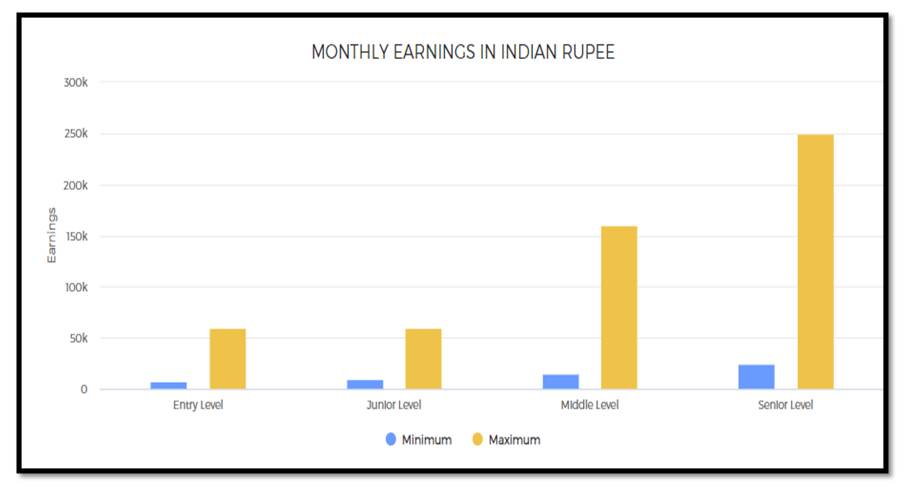
Monthly Earnings In Indian Rupee
Entry Level | Junior Level | Mid Level | Senior Level | ||||
Min Earning | Max Earning | Min Earning | Max Earning | Min Earning | Max Earning | Min Earning | Max Earning |
8000 | 60000 | 10000 | 60000 | 15000 | 160000 | 25000 | 250000 |
1. Entry level: 0 - 2 years of work experience
2. Junior Level: From 1 to 12 years of work experience
3. Mid Level: From 5 to 20+ years of work experience
4. Senior Level: From 10 to 25+ years of work experience (there could be exceptions in some high-end technical, financial, engineering, creative, management, sports, and other careers; also in the near future, people will reach these levels much faster in many careers and in some careers, these levels will have no meaning as those careers will be completely tech skill driven such as even now, there is almost no level in a Cyber Security Expert’s job)
Work Activities
1. Analysing and interpreting data and information: Analysis of data and information to find facts, trends, reasons behind situations, etc. interpretation of data to aid in decision making.
2. Coaching and developing: Identifying training and professional development needs of others; coaching and training them to develop skills to perform tasks and improve performance.
3. Communicating with co-workers and others: Communicating with people in writing, verbally or otherwise inside your workplace and various other people who have professional relationships with your place of work including vendors, government officials, etc. or with people at large.
4. Decision making and problem solving: Analysis of data and information; evaluation of alternative decisions and results of decisions; taking the right decisions and solving problems.
5. Developing and maintaining inter-personal relationships: Developing professional relationships with co-workers and others outside organizations and maintaining good relationships.
6. Estimating quantity, cost, time and resources: Estimating sizes, volumes, distance, and quantity; estimating and determining time, costs, and resources; estimating materials required to perform a task.
7. Getting Information and learning: Observing, hearing, reading, using computers, or otherwise obtaining information and learning from it.
8. Handling administrative activities: Handling various administrative tasks and managing day-to-day operations.
9. Inspecting situations, events, and people: Inspecting situations, events and people to understand the reasons and causes for the situation or events to happen; inspecting people to understand reasons behind their behavior and actions.
10. Leading: Inspiring and motivating co-workers to work to achieve specific goals; enabling and facilitating others to perform tasks effectively; addressing issues and solving problems in order to help people perform well.
11. Managing and supervising: Manging and supervising work of others; setting goals; giving instructions; monitoring work performance, etc.
12. Negotiating: Negotiating terms, conditions, costs, prices and about other issues.
13. Organizing, planning and prioritizing tasks: Planning and organising tasks in order to achieve work goals; prioritizing tasks to achieve goals and making the best use of the time available.
14. Providing advices and consultation to others: Giving advices or consultation to others about various issues, conceptual matters, know-hows, scientific matters, products or services.
15. Recruiting, enlisting and placing people resources: Sourcing, recruiting, selecting, enlisting and placing people in different positions and tasks in an organisation or for getting work done.
16. Scheduling tasks: Scheduling project timelines, tasks and activities.
17. Selling: Communicating about products and services with potential customers; influencing customers' decisions to buy products and services; helping people to buy products and services.
18. Strategic planning: Developing visions and goals, developing strategies and action plans for achieving visions and goals.
19. Working in a team: Working in a team of people; developing team; maintaining professional relationships among team members.
Future Prospects
Prospects in this career are moderated. India is the fastest growing economy and comes sixth under the largest economy in the world. It reached US$ 2.7 trillion economy from US$ 1.45 trillion and the estimated target for the next five years is to become an economy of US$ 5 trillion economy.
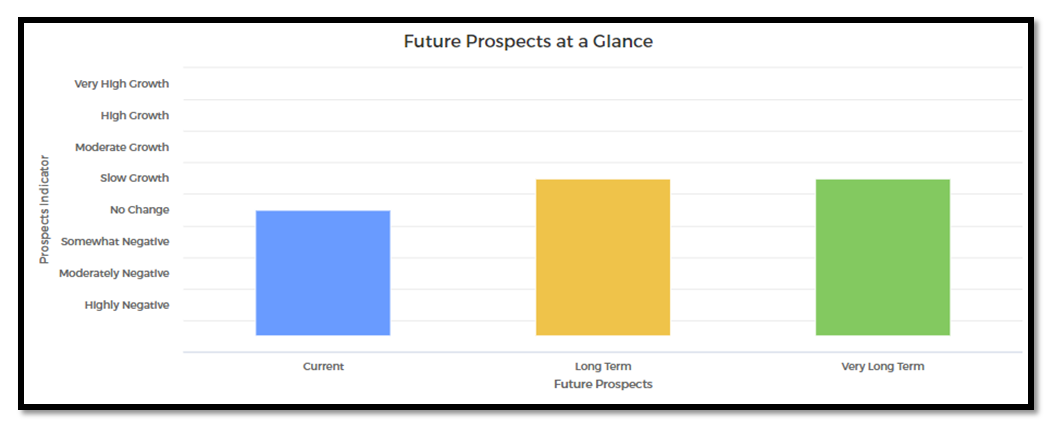
Future Prospects At A Glance
Current (0-1 year) | Long Term (2-5 year) | Very Long Term (6-10 years) |
No Change | Slow Growth | Slow Growth |

